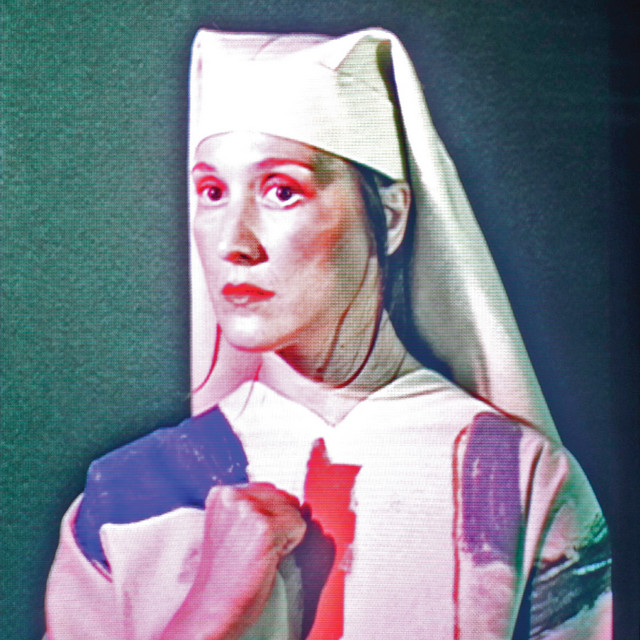MOST READ
- interview with xiexie オルタナティヴ・ロック・バンド、xiexie(シエシエ)が実現する夢物語
- Chip Wickham ──UKジャズ・シーンを支えるひとり、チップ・ウィッカムの日本独自企画盤が登場
- Natalie Beridze - Of Which One Knows | ナタリー・ベリツェ
- 『アンビエントへ、レアグルーヴからの回答』
- interview with Martin Terefe (London Brew) 『ビッチェズ・ブリュー』50周年を祝福するセッション | シャバカ・ハッチングス、ヌバイア・ガルシアら12名による白熱の再解釈
- VINYL GOES AROUND PRESSING ──国内4か所目となるアナログ・レコード・プレス工場が本格稼働、受注・生産を開始
- Loula Yorke - speak, thou vast and venerable head / Loula Yorke - Volta | ルーラ・ヨーク
- interview with Chip Wickham いかにも英国的なモダン・ジャズの労作 | サックス/フルート奏者チップ・ウィッカム、インタヴュー
- interview with salute ハウス・ミュージックはどんどん大きくなる | サルート、インタヴュー
- Kim Gordon and YoshimiO Duo ──キム・ゴードンとYoshimiOによるデュオ・ライヴが実現、山本精一も出演
- Actress - Statik | アクトレス
- Cornelius 30th Anniversary Set - @東京ガーデンシアター
- 小山田米呂
- R.I.P. Damo Suzuki 追悼:ダモ鈴木
- Black Decelerant - Reflections Vol 2: Black Decelerant | ブラック・ディセレラント
- Columns ♯7:雨降りだから(プリンスと)Pファンクでも勉強しよう
- Columns 6月のジャズ Jazz in June 2024
- Terry Riley ——テリー・ライリーの名作「In C」、誕生60年を迎え15年ぶりに演奏
- Mighty Ryeders ──レアグルーヴ史に名高いマイティ・ライダース、オリジナル7インチの発売を記念したTシャツが登場
- Adrian Sherwood presents Dub Sessions 2024 いつまでも見れると思うな、御大ホレス・アンディと偉大なるクリエイション・レベル、エイドリアン・シャーウッドが集結するダブの最強ナイト
Home > Reviews > Readers > Cate Le Bon- Pompeii
「立ち上がり、歩くこと。立ち上がり、歩くこと。彼がつまづかないことを示すこと。彼は大丈夫だ。大丈夫なのだ」。ジェームズ・ケルマンの『how late it was, how late』における主人公で、グラスゴー人のサミーは、家路につこうとするが、体が言うことをきかない。酔っぱらって頭にかかっていた靄はやがて晴れる。しかし彼は自分が一歩一歩、手と足を使って、身を隠すために奔走していることに思い当たる。
哲学の勉強のためにグラスゴーを歩き回った4年間で、私は移動することに価値を見出すようになった。飲酒文化が特に有名なこの街における「移動」は、少し飲み過ぎた後でも安全に家に帰れるということを示している。6年ほど前に東京に引っ越してからは、酒の量は減った。しかし定期的に東京の終わりのない通りや小道をぶらぶらと歩き回るようになった。決まった目的地がないときには、歩いているだけで気分が高揚する。
しかし、多くの人と同じように、パンデミック以来、私は室内から外を見て過ごすことが多くなった。ここ数年は、スコットランド文学を追いかけたり、様々なアーティストやコメディアンがTwitchというストリーミング・プラットフォームに活動の場を移していくのを見守ったりしている。そのなかでの個人的なハイライトのひとつは、「Rust」というゲームで自分の仮想上のクラブ・ナイトを作り、主催した Murlo だ。また、ちゃんとしたヘッドフォンを購入したことで、ポップとエクスペリメンタルを横断するような音楽への興味が再燃した。
スコット・ウォーカーの “It's Raining Today” を青写真に、私は、私の感覚をぶっ壊すような「歌モノ」の音楽をいつも探している。過去10年間では、ジュリア・ホルターの “エクスタシス” や、ディーズ・ニュー・ピューリタンズの “フィールド・オブ・リーズ”、クワイア・ボーイの “パッシヴ・ウィズ・ディザイア”、ガゼル・ツインの “パストラル・アンド・ソフィー”、オイル・オブ・エヴリー・パールの “アン・インサイド” の際立った、シュールな構造と興味深い歌詞に大きな影響を受けた。マルチ・インストゥルメンタリストでシンガー・ソングライターのケイト・ル・ボンの2019年のアルバム『リワード』が出たとき、アルバムではなくシングルのループ再生の面白さに気づくときまで、また別のお気に入りのアルバムを見つけたと思ったものだ。しかし3年後の新しいアルバム『ポンペイ』には、あらゆる意味で興奮させられた。
ル・ボンは、グラスゴーの賑やかな通りから離れたウェールズの田舎で育った。しかし、スコットランドや英国の他の地域と同様に、ウェールズもパンデミックによって特に大きな打撃を受け、政府の厳しい規制によって、彼女は7枚目のアルバム『ポンペイ』の制作を受け入れることを余儀なくされた。「レコードを作るときは、どこかに行って、自分を真空のなかに置きたいんだ」と、ル・ボンは最近のインタヴューで語っている*。パンデミックが発生したとき、彼女はアイスランドにいて、ジョン・グラントの『ザ・ボーイ・フロム・ミシガン』の制作作業を終えていた。このアルバムにおける温かいプロダクションは、グラントによる、この世のものとは思えないアメリカ中西部の疲弊した物語の端々を包み込んでいる。状況が悪化したとき、彼女はなんとかウェールズに戻ることができたが、カリフォルニアにある彼女の家からは、遠いところにいなければならなかった。
では(外的な状況によって、移動が)できないとき、人はどうやってどこかに行くのだろうか? ル・ボンの場合は、旅を内側に向け、外部からの交通が停止に近い状態で、ロックダウン中のアルバムに広大な地表を織り込むことによってだった。
オープニングの “ダート・オン・ザ・ベッド” では、サックスとベースの方向の違いが、「移動」をシミュレーションする。サックスが、ひっかかったかのようなオフ・ビートで、音の粒子に逆らって仰け反らせる間に、重みのあるベース音が勢いよくスイングし、前方の道を探る。サム・ゲンデルとサム・ウィルクスによる『ミュージック・フォー・サクスフォン・アンド・ベース』は、当時ヘヴィー・ローテーションされていたはずで、それをこの二元論的なレコードの、オルタナティヴなタイトルにすることは容易だったはずだ。サックスはドラムスとともに、彼女が外部に委託している唯一の楽器でもある。
低音域での歌唱がニコと比較されることもあるが、ここでのル・ボンのヴォーカルは、他の誰の声にも聞こえないくらい際立っている。『ポンペイ』のサウンドの方も、デビュー作『マイ・オー・マイ』のチェンバー・フォークや、2016年の『クラブ・デイ』の生き生きとしたポスト・パンクから離れたものになっているが、完全に異なるわけではない。アルバムのピークはメロウになり、それは、ロキシー・ミュージックのシンセサイザーと一緒に、雑談で時間を潰すには不安にすぎる、80年代のどこかに存在している。なにしろ、外では嵐が吹き荒れているのだから。
シングル曲 “モデレーション” のプレ・コーラスでは、「節度を、持つことができない。そんなものはいらない。それに触れたい」と、すべてが快調ではないことのしるしが現れる。思考が流動的になり、「できない(can't)」は「いらない(don't want)」へと後退し、それが「したい(want)」へと反転していく。長い孤独のなかで、最大の敵である自分の心の揺らぎを前にして、自分自身のアイデンティティや価値観が混乱に変わっていく。やがて晴れやかなギターが輝きはじめ、泣き叫ぶようなサックスがヴォーカル・ハーモニーからそれていく。そして、ル・ボンは自分自身が「混乱に縛られている」ことに気づく。
しかし、なお『ポンペイ』は前方へと進んでいる。それぞれの曲は、より広いタペストリーのなかで、際立った位置づけを保持している。不確かな曲たちは去り、その後には風景の変化が待っている。水平線には穏やかさが増しているのだ。晴朗な “ハーバー” では、彼女は自らのヴォーカルの低音域を捨てさり、浮遊感のあるファルセットを好んで使用している。彼女は、これまででもっともキャロライン・ポラチェクのように演奏していて、ゆったりとしたシンセ・ポップ的グルーヴは、ブルー・ナイルのレコードに収録されても違和感がないものだ。
最終曲の “ホイール” に至るまで、ル・ボンはヨーロッパの海岸線と、自然災害の現場を、安全に航海してきた。「目には見えない都市のフランスの少年たち」(“フレンチ・ボーイズ”)から “ポンペイ” の「記念碑的な怒りの上に作られた都市」まで、である。泣き叫ぶサックスは鳴りを潜め、ベースは誇らしげに行進する。自己が回復し、この力強く、感動的なレコードは終わる。
我々は元気を取り戻し、歩いている。我々はそれを乗り越えたのだ。
* https://www.undertheradarmag.com/interviews/cate_le_bon_on_pompeii
written by Ray Chikahisa
“Up and walking, up and walking; showing here he wouldnay be stumbling; he wouldnay be toppling, he was fine, he was okay”. Sammy, the Glaswegian protagonist in James Kelman’s how late it was, how lateis trying to make his way home, but his body is not cooperating. His drunken fog eventually clears, but he still finds himself scrambling for cover, using his hands and feet to navigate each step.
In the four years I spent walking around Glasgow studying for a philosophy degree, I came to value being on the move. Especially in a city famed for its drinking culture, being on the move means you’re safely returning home after a few too many drinks. Since moving to Tokyo almost six years ago, I drink less, but regularly head out to wander aimlessly through the city’s never-ending streets and pathways. Without a set destination, being up and walking takes on a state of mind.
Still, like many others, since the pandemic I have been spending a fair amount of time indoors looking out. In the past few years I have been catching up on Scottish literature, and watching various artists and comedians transition over to streaming platform twitch - one of my highlights being Murlo building and then hosting his own virtual club night on the video game Rust. I’ve also invested in a decent pair of headphones and resumed obsessing over music at cross-sections of pop and experimental.
With Scott Walker’s ‘It’s Raining Today’ as my blueprint, I’m always on the hunt for vocal music that subverts the senses. In the past ten years Julia Holter’s Ekstasis, These New Puritans’ Field of Reeds, Choir Boy’s Passive With Desire, Gazelle Twin’s Pastoral and Sophie’s Oil Of Every Pearl's Un-Insides have all affected me in a big way with striking, surreal architecture and lyrical intrigue. When multi-instrumentalist and singer-songwriter Cate Le Bon’s 2019 album Reward came out, I thought I’d found another favourite until I realised I was stuck in a listening loop with the singles and not the album. But three years on, and a new album had me all kinds of excited.
Le Bon grew up in the Welsh countryside, far removed from Glasgow’s busy streets. But like Scotland and the rest of the UK, Wales was hit particularly hard by the pandemic, and strict government restrictions forced her to adapt for her seventh album Pompeii. “When I make a record, I want to go somewhere and put myself in a vacuum,”* remarked Le Bon in a recent interview. When the pandemic hit, she had been in Iceland finishing up her production work on John Grant’s The Boy From Michigan - an album whose warm production grips at the edges of Grant’s weary tales from an otherworldly American Midwest. When conditions got worse, she had managed to return to Wales, but was kept apart from her home in California.
So how do you go somewhere when you can’t? In the case of Le Bon, you turn your travels inward, and weave an extensive geography into your lockdown album as external traffic nears to a standstill.
Right from the start of opener ‘Dirt On The Bed’, movement is simulated by the contrasts in direction from the saxophone and bass. Weighted bass notes swing forth with momentum, scouting the path ahead while saxophones, often snagging on an off-beat, brush back against the grain. Sam Gendel and Sam Wilkes’ Music for Saxofone and Basshad supposedly been on heavy rotation at the time, and it could easily have been an alternative title for this dualistic record. The saxophones, together with drums, are also the only instrumentation she outsources.
While comparisons to Nico follow her in the lower registers, by this point, Le Bon’s vocals are so distinctive it’s hard to hear anyone else. The sound of Pompeii has also moved on from the chamber-folk of her debut My Oh My, and the lively post-punk of 2016’s Crab Day, but not entirely. Its peaks have mellowed, it’s somewhere in the 80s, with a hand on Roxy Music’s synthesizers, but too anxious to stick around for the schmooze. After all, there’s a storm building outside.
Signs appear in the pre-chorus of single ‘Moderation’ that all is not well, ‘Moderation, I can't have it, I don't want it, I want to touch it’. With stream-of-thought fluidity, ‘can’t’ regresses into ‘don’t want’ which then flips into ‘want’. Our own identities and values turn to soup when facing our greatest adversary in times of prolonged isolation - our own wavering mind. Before long bright guitars begin to spark, wailing saxophones veer away from aligned vocal harmonies and Le Bon finds herself “tethered to a mess”.
And yet Pompeii travels onwards. Each song has its own distinct location within a wider tapestry. Songs of uncertainty depart, a change of scenery awaits, and calm grows in the horizon. Take the serene “Harbour,” where she casts aside the sobering lower registers of her vocal range in favour of buoyant falsetto. It’s the most she’s ever sounded like Caroline Polachek, and the slow-burner synth-pop groove wouldn’t be amiss on a Blue Nile record.
By the time of final track ‘Wheel’, Le Bon has navigated safe passage through European coastlines and sites of natural disaster, from the ‘French boys in invisible cities’ to Pompeii’s ‘Cities built on monumental rage’. The wailing saxophones have simmered, and the bass marches on proudly. The self is restored, and so draws this emphatically moving record to a close.
We’re back up and walking. We made it through.
* https://www.undertheradarmag.com/interviews/cate_le_bon_on_pompeii
Ray Chikahisa(訳:小山哲央)
ALBUM REVIEWS
- Loula Yorke - speak, thou vast and venerable head/ Loula Yorke - Volta
- Actress - Statik
- Black Decelerant - Reflections Vol 2: Black Decelerant
- High Llamas - Hey Panda
- The Stalin - Fish Inn - 40th Anniversary Edition -
- KRM & KMRU - Disconnect
- Cornelius - Ethereal Essence
- Kronos Quartet & Friends Meet Sun Ra - Outer Spaceways Incorporated
- Martha Skye Murphy - Um
- Mouchoir Étanche - Le Jazz Homme
- Taylor Deupree - Sti.ll
- John Cale - POPtical Illusion
- Amen Dunes - Death Jokes
- A. G. Cook - Britpop
- James Hoff - Shadows Lifted from Invisible Hands


 DOMMUNE
DOMMUNE

